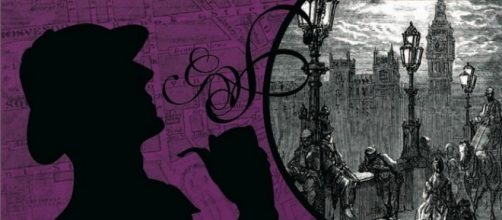One of the joys about the Sherlock Holmes pastiches is the sheer inventiveness of them. Holmes and Watson are highly malleable and can be into a variety of stories and settings. He's fought computers, Martians, vampires and Opera phantoms, to name a few. One of their foremost authors, Holmes scholar David Stuart Davies, decided to go one step beyond and turn the canon itself, with no supernatural flim-flam, on its head.
How so? By stating that dear John Watson was, in fact, disgraced army surgeon John H Walker, in the employ of Professor Moriarty to spy on the rising star of Sherlock Holmes .
In return for a new identity, following dereliction of duty and drunkenness in Afghanistan, Watson spies on Holmes as he becomes the foremost authority on crime fighting while Moriarty builds his empire...
'Veiled Detective' has a great premise and two strong first acts
Given his history with the franchise, Davies is near unmatched in emulating the Arthur Conan Doyle style, capturing Watson/Walker's voice perfectly and not skimping on those historical details and canon references just sweetens things more. Just seeing all the little twists done to familiar faces like Mrs Hudson or Mycroft is a geeky pleasure, and yet, it never feels indulgent. This is thanks to the story's closer look at Watson/Walker's background and psyche.
Walker feels like a three-dimensional man with his own set of demons, yet he's still very much the Watson we know and love. Seeing how his relationship with Holmes slowly changes him thoroughly humanises a character often used more for posing questions or comic relief. On top of that, we get a more fallible and human Holmes than normal, enhancing that blooming relationship between the two, and possibly the most threatening Moriarty I've read in some time. He feels like a ruthless yet highly calculating puppet master, and he commands your attention every time he's on the page.
Where 'Veiled Detective' stumbles is in its final act
It amounts to a very truncated take on 'The Final Problem' and the final showdown with Moriarty isn't quite as developed as it could be.
After the build up and the altering of familiar Holmes characters and lore, it lacks that final gut punch that befits this more emotional take on the material. In addition, Davies does skip a fair chunk of the canon after this version of 'Sign of Four', which is a shame as I would've loved to have seen how Davies could've toyed with the likes of 'Baskervilles', 'Valley of Fear' and the other iconic short stories. I suppose it's a testament to the writing quality that I was happy to sacrifice pacing just to be in this alternate universe longer, but it still feels like a missed opportunity nonetheless.
Top notch writing and pacing, as well as some much-appreciated examination of our iconic duo, make 'Veiled Detective' a quality read.
It may come up a bit short against other Sherlock classics, with a conclusion that didn't make the most of the book's premise, but the first two thirds and Davies' storytelling skills were so good I left satisfied.


